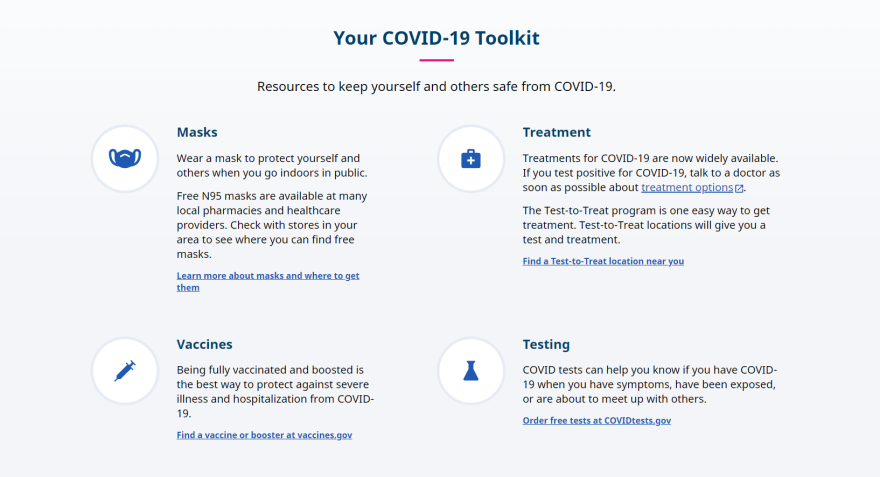Updated March 30, 2022 at 12:38 PM ET
The search for COVID vaccines, tests and treatments could get easier Wednesday with the White House launch of COVID.gov, a website meant to be a one-stop shop for everything from free high quality masks to antiviral pills.
"We could not have done this six or eight months ago because we didn't have all the tools we have now," said White House COVID response coordinator Jeff Zients in an interview with NPR.
With the website launch, the White House is following through on a promise President Biden made in his State of the Union address. In that speech he announced a test-to-treat program "so people can get tested at a pharmacy, and if they're positive, receive antiviral pills on the spot at no cost."
The antiviral pills, especially Paxlovid from Pfizer, are highly effective at preventing hospitalization and death among people who are at high risk of severe disease from COVID infection. But they have to be taken within the first five days of the onset of symptoms. There's been a disconnect between people getting diagnosed and actually getting these life-saving medications.
Up until this point, actually finding participating clinics and pharmacies wasn't simple. According to the White House, there are now more than 2,000 test-to-treat locations around the country where people can get tested for COVID-19 and, if a prescriber says they need it, immediately get antiviral pills. COVID.gov has a new locator tool, making it easier to find these services quickly.
In addition, the site offers:

"The new website is a great idea in theory," said Jerome Adams, who served as surgeon general in the Trump administration. He said he has often been supportive of Biden administration initiatives but says they've always been reactive rather than proactive. So, Adams said a website is wonderful if you have the tools to utilize it like internet access and a computer.
The test-to-treat locator can be more challenging to navigate on a mobile device than a desktop, for instance.
"The communities statistically most likely to need the services that are to be offered on the website are also the communities that are statistically most unlikely to be able to access it," Adams added. "In other words, this could actually increase inequity."
Many of the items on this new website have been available elsewhere, like information from the CDC about levels of COVID spread in your community or the form to order free at-home rapid COVID tests. But this puts them all in one place at a time when the White House is trying to move from the crisis phase of the pandemic to a time when it is manageable and not as disruptive as it has been.
"The nation's medicine cabinet is full of effective treatments, we have free at-home tests, high quality masks, vaccines and boosters all available, so the website brings all these tools together and makes it convenient," said Zients, who is leaving his role at the White House soon.
But, Zients added that if Congress doesn't come through with the additional COVID relief funds the White House has been asking for, these tools may not be there when people really need them. At the moment, with COVID case numbers, hospitalizations and deaths are all on the decline, there are plenty of rapid tests. And antiviral pills, which had been scarce, are plentiful now, too. But that's largely thanks to government purchasing contracts.
Already the White House has had to forgo a new contract for monoclonal antibody treatments and a program to reimburse providers for testing and treating people who are uninsured is winding down.
Congressional negotiations are ongoing.
Biden on Wednesday is scheduled to give an update on the country's fight against COVID-19. In addition to drawing attention to the new website, Zients said Biden will "once again issue the urgent call for Congress to act and provide the funding."
The concern is less about today. There's plenty of supply. It's about what happens six months from now if there is another COVID surge, like is happening now in Asia and Western Europe.
"We need to continue to protect the American people and prepare for any scenario," Zients said. "I think it's clear that the virus is unpredictable and moves fast and is not going to wait for Congress, so Congress needs to act urgently."
The COVID.gov website was designed to be as accessible and easy to use as possible. It is available in English, Spanish and a simplified Chinese, and the writing is purposely simple so the largest possible audience can understand and use the site. There is also a phone number for people who aren't comfortable with the web.
Copyright 2022 NPR. To see more, visit https://www.npr.org.




